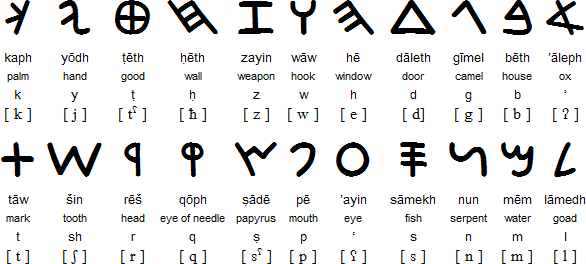I started a thread 2 days ago called http://christianchat.com/bible-discussion-forum/111219-lords-prayer-hebrew.html
There was more interest in language translations than discussion that could have expanded spiritual meaning to each phrase Jesus used to teach the diciples how to pray, so I thought it would be interesting to talk about the Hebrew language, where, when , and how it came to be.
So what was the one language spoken prior to the Tower of Babel?
The following is from a website "the origin of the Hebrew language"
When God created Adam he spoke to him (Genesis 2:16) indicating that God gave Adam a language and this language came from God himself, not through the evolution of grunts and groans of cave men. When we look at all the names of Adam's descendants we find that all the names from Adam to Noah and his children are Hebrew names, meaning that their name has a meaning in Hebrew. For instance, Methuselah (Genesis 5:21) is Hebrew for "his death brings" (The flood occurred the year that he died). It is not until we come to Noah's grandchildren that we find names that are of a language other than Hebrew. For instance, the name Nimrod (Genesis 11:18), who was from Babylon/Sumer/Shinar and possibly the Tower of Babel, is a non-Hebrew name. According to the Biblical record of names, Adam and his descendants spoke Hebrew.
My other question is why did Jesus speak to Paul in the Hebrew language? (Acts 26:14) What was the purpose of doing that when people spoke mostly Greek and or Aramaic during the time of Paul?
As I research, I find that most scholars say the Hebrew language is much different today than it was during the time of Paul, and also a stark difference in that language from Abraham to Paul's day. It is obvious that Paul spoke just about all dialects known during his day, so why did Jesus have to speak to Paul in Hebrew? Couldn't Paul have understood the same message from Jesus in the Aramaic or the Greek language? Maybe it was necessary for Paul to know that it truly was Jesus the true Messiah, and not just the God Saul knew. But if that were the case, Paul knew that the language came from Abraham and his descendants which makes the language Paul heard no big deal. Jesus told him who He was.
"And I said, Who art thou, Lord? And he said, I am Jesus whom thou persecutest." Acts 26:15
What makes the Hebrew language so special in New Testament writings if it wasn't the language normally spoken then?
There was more interest in language translations than discussion that could have expanded spiritual meaning to each phrase Jesus used to teach the diciples how to pray, so I thought it would be interesting to talk about the Hebrew language, where, when , and how it came to be.
So what was the one language spoken prior to the Tower of Babel?
The following is from a website "the origin of the Hebrew language"
When God created Adam he spoke to him (Genesis 2:16) indicating that God gave Adam a language and this language came from God himself, not through the evolution of grunts and groans of cave men. When we look at all the names of Adam's descendants we find that all the names from Adam to Noah and his children are Hebrew names, meaning that their name has a meaning in Hebrew. For instance, Methuselah (Genesis 5:21) is Hebrew for "his death brings" (The flood occurred the year that he died). It is not until we come to Noah's grandchildren that we find names that are of a language other than Hebrew. For instance, the name Nimrod (Genesis 11:18), who was from Babylon/Sumer/Shinar and possibly the Tower of Babel, is a non-Hebrew name. According to the Biblical record of names, Adam and his descendants spoke Hebrew.
My other question is why did Jesus speak to Paul in the Hebrew language? (Acts 26:14) What was the purpose of doing that when people spoke mostly Greek and or Aramaic during the time of Paul?
As I research, I find that most scholars say the Hebrew language is much different today than it was during the time of Paul, and also a stark difference in that language from Abraham to Paul's day. It is obvious that Paul spoke just about all dialects known during his day, so why did Jesus have to speak to Paul in Hebrew? Couldn't Paul have understood the same message from Jesus in the Aramaic or the Greek language? Maybe it was necessary for Paul to know that it truly was Jesus the true Messiah, and not just the God Saul knew. But if that were the case, Paul knew that the language came from Abraham and his descendants which makes the language Paul heard no big deal. Jesus told him who He was.
"And I said, Who art thou, Lord? And he said, I am Jesus whom thou persecutest." Acts 26:15
What makes the Hebrew language so special in New Testament writings if it wasn't the language normally spoken then?

